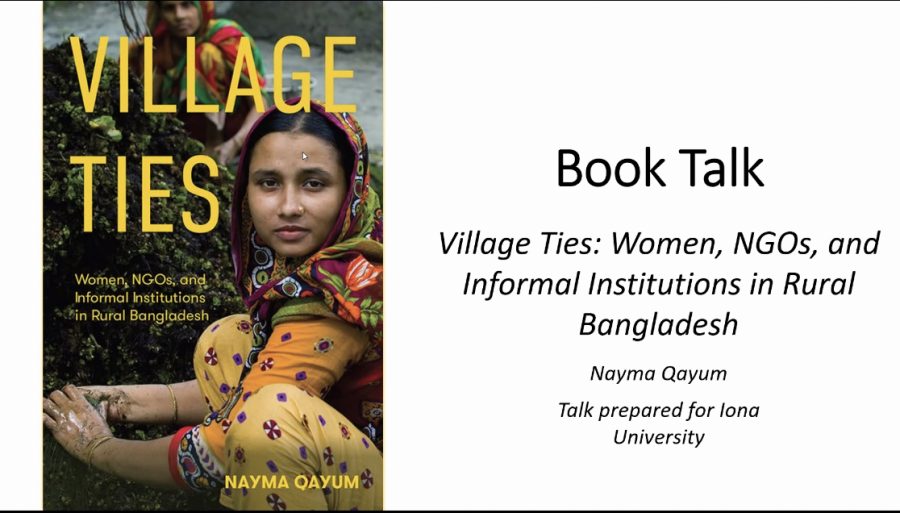Iona hosts book talk on ‘Village Ties’
Village Ties: Women, NGOS, and Informal Institutions in Rural Bangladesh discusses how women have played a pivotal role in Bangladesh’s development.
May 4, 2023
The Institute of Thomas Paine Studies (ITPS), Office of Diversity, Equity, Inclusion & Belonging (ODEI&B) and the Political Science department hosted a book talk on Tuesday discussing “Village Ties: Women, NGOS, and Informal Institutions in Rural Bangladesh” by Dr. Nayma Qayum in honor of Asian American and Pacific Islander Heritage month.
Dr. Zaino, a Political Science at Iona, moderated the event. Book Talk: Village Ties is Dr. Qayum last talk of the semester. She is an associated professor of Asian studies and global and international studies at Manhatanville College in Purchase, New York. She received her Ph.D. from the Graduate Center, City University of New York. Dr. Quayum teaches classes about Comparative Politics, Global and International Studies, and Asian studies. She has also held research positions at BRAC and UNDP New York.
Her book, published by University Press, Village Ties: Women, NGOS, and Informal Institutions in Rural Bangladesh discusses how women have played a pivotal role in Bangladesh’s development. Usually when women in the global south are mentioned internationally, they are often talked about as victims instead of leaders. Dr. Quaymen self-describes the book to be about “bad rules” and how to change them.
There are two types of rules – formal and informal rules. Formal rules, written or parchment rules, such as laws. While informal rules are invisible and unwritten, otherwise known as social norms. Informal rules are what is expected of us, what we think others do and what we think others expect us to do. Formal and informal rules are often at tension as Dr. Quaymen later explains.
Dr. Quaymen presented historical context for the audience to better understand the significance of women leadership. Bangladesh has an interesting story or as Dr. Quaymen claims, a development miracle. Bangladesh experienced dual colonialism, under the British empire and Pakistan. Therefore, experiencing a hodgepodge of laws of British and village law. In the past fifty years, the country has risen from the ashes of war and genocide. Bangladesh was among the poorest countries but has experienced unprecedent growth due to aid-based development. Both large and small NGOS entered the villages to provide services with the quality of life for women increasing. There was backlash from the clergy who did not want the women outside. Thus, Bangladesh experienced a rise in women’s movements.
Dr. Quaymen points to the Polli Shomaj (PS), a women’s mobilization group, as an example of exceptional women leadership. Their goal is to challenge oppression, acquiring services, local governance, and legal issues. In the legal domain, the PS increases poor women’s access to the law through responding to incidents, recording incidents, and advocate for poor women in shalish. Unfortunately, due to a lack of funding, the PS is unable to provide as many services as it did in the past.
The PS combat against issues such as dowry and child marriage. Dowry is the transfer of resources from the bride’s family to the groom’s family. It places a tremendous burden on parents of young girls. Dowry is condemned by the majority including Islamic groups.
However, it is a fairly new practice among Bangladeshi Muslims. Dowry was outlawed in 1929 but in 2017 a provision allowed it to be legal again. Yet, dowry was practiced regardless of its legality. Dowry and child marriage are gendered norms. For instance, dowry is the reason daughters are seen as expensive. Gendered norms in Bangladesh are shaped by duty. The ultimate goal is for women is to get married, while the men are seen as the providers. If someone does not adhere to gendered norms, they will be chastised by society and isolated from the community.
Dr. Quaymen states that institutional change if possible but it takes time. For instance, laws can in placed such as the law prohibiting child marriage, but social norms may prevail. Power structures, including gendered institutions dictate outcomes. Change comes from the community. One of the reasons why the PS were so successful is because they consulted with elders, convicting their work would be beneficial for everyone. The primary reason why women’s mobilization group fail is because they were not supported. Communication is key, engaging the entire community establishes groundwork for institutional change.




